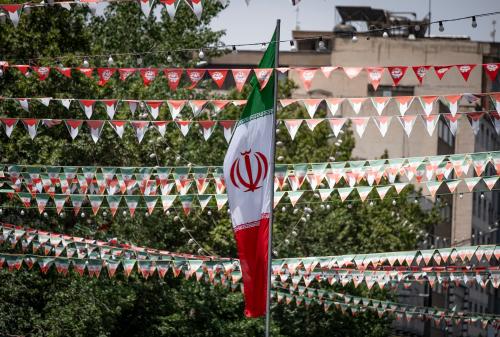Ever since he began his drive for the presidency, George Bush has rightly argued that the 1972 Anti-Ballistic Missile Treaty banning all nationwide missile defenses is outdated. It was designed to limit an out-of-control superpower nuclear competition during the Cold War, not to handle a world in which the likes of North Korea, Iran, and Iraq could soon acquire long-range missiles capable of delivering weapons of mass destruction against the American homeland.
However, the Bush administration may soon adopt a cure worse than the disease. It may withdraw from the ABM Treaty, further stating that it no longer will accept any limitations on missile defenses whatsoever. Such a move would not hasten the day when the United States and its allies could be protected against the looming missile threat. Yet it would entail major strategic costs, and those costs would be incurred right away.
Mr. Bush is right that the ABM Treaty has become an impediment to improving U.S. security. Not only does it ban deployment of national missile defenses. It also bans the development and testing of many possible NMD technologies. The Clinton administration´s proposal for a fixed, land-based defense system could be researched, developed and tested without violating the treaty. However, other more promising technologies notably, most boost-phase defenses that would shoot down enemy missiles shortly after launch cannot be legally developed or tested. As a result, the Bush administration has good reason to want relief from the current treaty regime, and to want it rather soon.
My fellow Democrats who would object to such a decision by the new administration should remember that Bill Clinton was close to a decision to withdraw from (or at least selectively violate) the ABM Treaty last year. Moreover, several former Clinton administration officials have been among the most prominent voices calling for boost-phase defenses based on land, in the air, or on ships. The logic of that position also requires relief from certain parts of the ABM Treaty quite soon.
However, discarding the treaty entirely would be a major mistake. Russians who recognize that the United States has no hostile intent against their country might not care viewing questions of the strategic nuclear balance as no more relevant today than the teachings of Marx or Lenin. However, those Russians are few and far between. Most have more complicated views of the United States and do not fully trust it. Even if Mr. Bush announced modest additional cuts in offensive nuclear forces as part of his decision to withdraw from the ABM Treaty, Russian nationalists, hard-liners, and military planners would worry that the sum total of his new plan amounted to a renewed American quest for unilateral nuclear advantage at their expense.
But one might ask, so what? Even if Russia wanted to retaliate by suspending offensive arms control agreements, it can no longer afford a nuclear competition with the United States. After a bit of bluster from Moscow, the argument goes, Russia would accept this move from Washington just like it accepted German reunification, NATO expansion, and the 1999 war over Kosovo.
Perhaps. But nuclear weapons issues affect Russia’s core security interests much more than events in Kosovo or even Germany. Moreover, Moscow could do much more than derail the START process. It might well suspend Nunn-Lugar cooperative threat reduction programs designed to consolidate and secure Russia’s frighteningly scattered nuclear materials. Many Russians already believe that such programs are essentially a clever form of American espionage and would welcome their demise. Were Nunn-Lugar efforts ended, the risk that Russian nuclear materials could be stolen or sold abroad would surely grow. Out of pique, and out of a competitive desire to complicate America’s strategic position, Russia could also expand sales of missile and nuclear technology to the likes of Iran.
Therefore, if the United States soon withdraws from the ABM Treaty, it should simultaneously make several other points to Moscow:
- That for at least the next one to two years, we will continue to comply with ABM Treaty restrictions except those that prevent research, development, and testing of missile defense technologies,
- That our missile defense efforts are not focused on Russia but on the likes of Iran, North Korea, and Iraq,
- That U.S. missile defense deployments will be limited in magnitude, perhaps according to the ABM Treaty’s original numerical ceiling of 200 interceptors, and that we are willing to sign a new treaty formalizing such limits once it can be negotiated,
- That we will emphasize boost-phase technologies on land, at sea, or in the air. These systems could not threaten the Russian (or Chinese) deterrents because they could not intercept missiles launched from the interiors of those large countries,
- That we would consider cooperative efforts, such as basing some boost-phase defenses on Russian soil if threat conditions so warrant
With this sort of approach, Mr. Bush can realize Ronald Reagan’s dream of defending America and do it without either busting the bank or harming American security in other ways.
The Brookings Institution is committed to quality, independence, and impact.
We are supported by a diverse array of funders. In line with our values and policies, each Brookings publication represents the sole views of its author(s).



Commentary
Op-edABM Treaty Under Attack
April 26, 2001